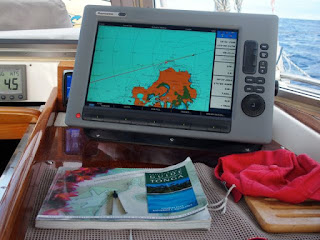Island time, they call it.
It meanders. It ambles. It passes from morning to night and back to
morning again without great urgency.
What doesn’t happen today can happen tomorrow. And it may. Vava’u is a small island, they
tell you. Slow down. Nothing’s going
anywhere.
 |
| Main street Neiafu (and below) |
VHF channel 26, which we belatedly discover is the party
line on which communication between town and anchorage is broadcast, buzzes
with plans made and plans un-made.
 |
| A trough engulfs Vava'u |
Thick rain hammers down, depositing nearly 170 mm in a 24
hour period, and then some. It slated the thirst of island vege patches and
plantations, as well as washing away untethered bailers and dinghy seats,
overflowing water tanks and muddying the clear waters around Neiafu.
 |
| The small boat harbour in Neiafu - before the rain |
The only boats leaving port are big recreational fishing
trawlers, heading back to NZ on the back of the low. Neiafu harbor, otherwise known as Port of
Refuge, holds the rest of the Pacific fleet like a magnet in the uneasy weather
conditions which prevail across west Polynesia.
 |
| Cafe Tropicana - one of several Neiafu yachtie hangouts |
 |
| The main attraction is fast wifi |
 |
| Still getting weather on the boat via SSB radio |
 |
| The anchorage is pretty full at Neiafu |
We are moving no faster than anyone else. Alex ‘s back has gone out in sympathy with
Marce’s. It happens, sometimes just on the strength of a sneeze. On Sunday,
when the island was quiet except for the sound of church bells and
congregational harmonies, we wandered further from the boat than we’d managed
in the previous six days, Alex wearing his back brace and hiking boots. From the lookout on Mt Talau, the topography of Vava’u waterways and
anchorages was laid out below us. Such a
compact cruising ground. No wonder the charterers love it. And we will too when
we get there.
 |
| The view down Neiafu harbour - Port of Refuge - from Mt Talau |
 |
| Out there is where I want to be |
 |
| There's a church every 500 m, it seems (Mt Talau radio tower in the background) |
 |
| Sunday best (and below) |
 |
| Pork growing for feast days |
 |
| On the road to Mt Talau (and below) |
Because Alex was not mobile, and the rain was torrential, we
didn’t make it to the fund-raiser held at Aquarium café on Monday night for Tim, a
single-hander friend who lost his boat Liberty
Call late last week coming into Vava’u.
Tim left Bora Bora a couple of days before we did, bound for
Tonga. He didn’t have a SSB radio on board, so he didn’t check into the net,
but we often thought of him en route. It’s
tough enough making these long passages two-up, but how on earth does a
single-hander do it?
Turns out sometimes they don’t.
This is the story, as he’s told me and others (notably
Tongan officialdom, several times over). He was doing fine, sleeping in snatches but
keeping it all together, until three days out of Vava’u. Then he got sick and
stopped eating. His memory is vague, but
it seems that he was on a lee shore (Vava’u’s west coast) when he hove-to, and
because he was exhausted, and weak, and had taken a tablet for the nausea – or
whatever it was – he fell asleep.
What woke him was something all mariners dread – the impact
of hull hitting rock. It wasn’t a gentle nudge either. Liberty Call, which is a 32 ‘ fiberglass boat, was hurled onto the
limestone by the ocean swell. The surge
pulled her back, and he started the engine, but then a second breaker picked her
up and dumped her again onto the rocks. That was the end of her. Seawater was up to his knees in the cockpit
before he could think of launching his liferaft.
He grabbed his In-reach phone and American passport, (“nothing
else I could see down below was worth dying for”), put on a yellow life vest and
– smart guy - a pair of fins. Then he
abandoned ship and swam for shore. Five minutes later he watched as Liberty Call went down.
 |
| Liberty Call (boat on right) in Taiohae Bay, Nuku Hiva |
Trapped by high cliffs, he couldn’t walk out. He waited for
morning to come before using his phone to text his girlfriend in California. He was just about to send an SOS text when a
whale-watching boat spotted him, by chance, and brought him into Neiafu.
We saw him later that same evening. He looked 10 years
older, drawn and stunned. He was wearing
a borrowed rugby jumper, the wet clothes he’d swum ashore in being all he had
to call his own. He’d been well cared for by a kind local volunteer, who’d
taken him where he needed to go, and after that scooped up by the good people
on Rafiki who’ve given him a berth and as importantly, I reckon, regular doses
of Irish humour.
Last I saw him he said he was feeling lucky.
 |
| Tim on Nuku Hiva - on a happier occasion (and below) |





































